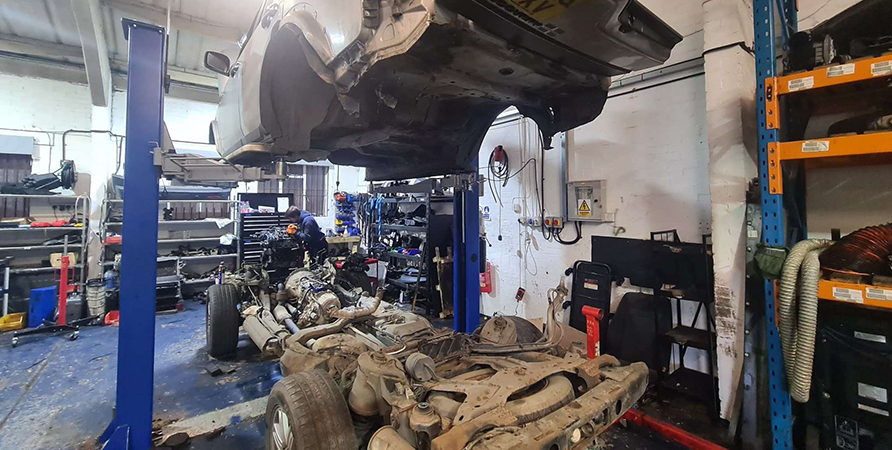
When we talk about the luxury SUVs, a name always comes to our mind, that is Land Rover. Land Rover, with its robust performance and eye-catching body style, remains a top contender. This SUV is particularly known for its high-power engines and off-road capabilities. Whether city roads, high ways or tough terrains, Land Rovers provide exceptional performance. The main component of this SUV is its powerful engine. No doubt Land Rover engine is one of the most reliable and high-performance engines in the automotive industry. But it can also experience problems with the passage of time, and if it begins to fail, it can lead to costly breakdowns or even complete engine replacement.
If you know how to spot the early signs of engine failure, then you can avoid costly repairs and time wastage. And you can avoid the mental stress which you have to face when an engine problem arises suddenly. Whether you have been driving a Land Rover for years or have a plan to buy a used one, it is important to learn how to recognise engine issues early so you can fix them before they get bigger. In the case your engine is beyond repair or dies completely, having access to a reliable Land Rover engine for sale can be a game-changer. It can save you money on replacing the whole vehicle.
Any engine usually doesn’t die or break down without showing some signs first. The key to avoiding costly repairs and potential breakdowns is knowing how to spot these early warning signs before the engine breaks down completely. In this guide, we will look into the common signs of a failing engine and what you can do to fix them before the engine gets damaged to a greater extent.
Every vehicle makes noise while running. But once you get used to how your Land Rover sounds when running properly, then you can know that something is wrong in case of a different sound while running. It can be a knocking, tickling or tapping noise from the engine bay, and it could be the sign of a serious engine problem, so you should not ignore it.
A knocking sound could be a sign of worn-out engine bearings. Engine bearings allow the engine parts to move smoothly, so if they fail engine can be seized completely. And if you hear a ticking sound, then it means low oil pressure, faulty lifters, or valve issues. Ignoring these sounds can damage your engine badly, so fixing them on time can save you from expensive repairs.
The check engine light is not just an annoying warning on your dashboard. It is a sign alerting you that there is a problem with your vehicle. When this light turns on and stays on, it means your Land Rover’s computer has found an issue, usually with the engine, fuel system, or emissions. It is the signal to check your Land Rover.
There are some issues that are not so big, like a loose fuel cap, but others can be more complex and serious. The best method to find the exact issue is a diagnostic scan. It is necessary to go for diagnostics as soon as possible, as delaying it can increase the damage. If you see your vehicle’s check engine light is flashing, then you should stop driving immediately, as it shows critical issues that could cause an engine breakdown.
Has your Land Rover suddenly lost its punch? A drop in acceleration, sluggishness, or difficulty climbing hills could all be symptoms of a struggling engine. You might also notice hesitation when shifting gears or that the vehicle struggles to maintain speed.
Do you feel that your Land Rover’s performance is down from before, or is it slower? If your vehicle is not accelerating like before, feels sluggish, or has trouble going uphill, then your engine might be experiencing performance issues. You may also notice that gears are not changing in a smooth way or difficulty in keeping the speed up.
It’s normal to see a small amount of smoke from your car’s exhaust, especially when the engine is cold. But if you notice a lot of smoke from the exhaust or if the smoke looks unusual colour like white, blue, or black, then there could be a problem with your engine.
Each of these issues can lead to engine failure if left unchecked. If you notice thick, persistent smoke from the tailpipe, don’t ignore it.

Cooling system problems can develop in the Land Rover vehicles, especially with the older models. If you notice that the temperature gauge regularly climbs into the red zone or comes out from under the hood, then it is a serious concern.
An overheating can cause a lot of damage to the engine. It may warp the cylinder head, blow the head gasket or even crack the engine block. These components are all necessary for the smooth performance and are expensive to repair. Common causes of overheating include a faulty thermostat, a broken water pump, coolant leaks, or a blocked radiator. You should regularly check the coolant levels and never ignore the overheating symptoms.
When your Land Rover is idling, it should be in stable condition. If your vehicle engine shakes, vibrates more than normal condition or stalls unexpectedly, then it is a sign that your engine is misfiring, not enough fuel reaching the engine or has air intake problems.
It can be due to faulty spark plugs, ignition coils, or dirty fuel injectors. Maybe you take these as minor problems, but these can cause internal damage to the engine and wear out important parts.
Engine oil is important for lubrication and the proper functioning of the engine. If you notice oil spots under your vehicle in the parking place, then it means oil leakage. Oil can leak from the valve cover gasket, oil pan, or seals. If oil is leaking from your vehicle, then besides oil loss, dust and debris can also enter into engine.
If a low oil pressure warning displays on your car’s dashboard, then take it seriously. It’s one of the most critical alerts. It means your engine isn’t getting enough oil to keep its parts properly lubricated. It can seize engine components. You can prevent this by checking oil level regularly and looking for any leaks or sudden drops in oil. If you see this warning, stop driving and check the problem.
Land Rover vehicles are not known for providing good fuel economy, but if you notice a sudden drop in fuel efficiency, then it is a sign that something is wrong with the engine. Often, when the engine is working harder than usual due to some internal issues or a malfunctioning sensor then it consumes more fuel.
If your vehicle has worn spark plugs, faulty oxygen sensors or issues with the fuel system, then the fuel consumption might be increased. These issues may not cause the engine to fail right away, but these are the signs that the engine is working harder than normal. If not solved timely, then these issues can cause serious damage.
It is necessary to spot the Land Rover engine issues early, but it is not a complete solution to the problem. Spotting the problem is just the first step, the main thing is to act the right way. If you spot the issue on time, then you should schedule a check-up with a trusted mechanic or a Land Rover specialist. A diagnostic test on time can prevent you from the costlier repairs later.
If you experience engine problems with your Land Rover, then it does not mean that its life is over. But you have to act as soon as possible to solve the problem, otherwise you can face serious damage, and your engine may die in case of more complex issues. If you notice unusual noises, performance issues or overheating, then it is a sign that your vehicle is not in proper condition. The key is to stay alert and, on noticing the problem, solve it immediately. By spotting problems earlier and maintaining regular servicing schedules, you can extend the life of your Land Rover.